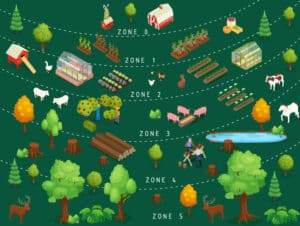Those who are new to the world and concepts of permaculture often have an unclear and hazy picture of what permaculture is, in theory and in practice. As a permaculture designer and consultant, I come across this all the time in my work. And as a writer in this field, I like to help people come to a clearer understanding. You may have a vague idea that permaculture is about growing organically, and may have formed images of food forests or no dig gardening. You may have heard the term permaculture alongside other rather vague terms like eco-friendly, green, and sustainable living. But it is important to understand that permaculture is more than just those individual methods or practices. It is a blueprint for sustainable design, a movement, an ethos and a way of life.
There is no one size fits all approach in permaculture. And permaculture stretches far beyond the garden or farm. So if you are new to permaculture, rather than diving right in at the deep end and learning about specific ideas often employed within this movement, it is important to take a look at what the term really means, beyond just ‘permanent agriculture’ or ‘permanent culture’. One good place to begin is with the central ethics and principles that underpin all permaculture approaches and designs.
The Core Ethics of Permaculture
At its heart, permaculture boils down to three central ethics, or rules with a very simple and easy to understand message:
These three core ethics of permaculture are:
- Care for our planet
- Care for humanity
- And fair share (or return of surplus to the system)
In our design work, our decision making, and in our daily lives, contemplating these three simple ethical goals can help us to stay on the right path, and work towards a future filled with hope for future generations.
Planet Care
Respect and love are central to permaculture’s guidance. We all depend on the natural gifts of this planet we call home, even though we can often feel rather disconnected from nature’s wonders in our modern world. Permaculture reminds us that our own health is intrinsically linked to the health of our planet, its ecosystems and all the life that those natural systems contain. But planet care is about more than just a recognition that our planet is the only one we have, and that when it and its systems are imperilled, this is an existential threat. It is also about valuing our planet and its treasures in their own right – and not only for what they can give us. It is only when we truly care for our planet and respect it that we will truly be able to love it, and protect what we love.
Respect and love are crucial to true ‘care’. We need these things in order to achieve the harmony with the natural world that is central to a permaculture approach. If this sounds rather hippyish, or twee, remember that thinking about truly caring for our planet home is really about practical, real-world actions and their consequences. At its heart is a very simple message, that kindness in thought, word and deed involves thinking a lot more deeply about how we live our lives. We should simply aim to do no harm and, only then, ask ourselves what we can do to enhance and aid the natural world around us.
It’s about acting as considerate beings – as what we truly are – just one organism in a huge, beautiful and complex system. It’s about making sure we are beneficial to the whole, rather than the fly in the ointment, or a virus on our planet, spreading out of control. As considerate and caring people, we all have the power to change things for the better. It is within our gift to show that humanity can be a strong force for good, as well as causing problems for our planet and its many other inhabitants. Learning how to do so is a big part of what permaculture is all about.
People Care
As well as containing a strong recognition of the worth or value of our planet and its other inhabitants, permaculture also contains a strong recognition of the power and value of people, and the amazing things we can do as individuals when we work together.
Permaculture teaches that in all we do and as we live our lives, we should always bear in mind the consequences of our actions, not only on natural systems but also on other people – locally and globally. As with planet care, people care also comes down to ideas of respect, love and simple kindness. Permaculture is not just about ensuring that our planet can continue into a hope-filled future. It is about making sure that people will be there too. And that not just the lucky few, but everyone, is brought along for the ride.
A strong concept in permaculture involves thinking about other people globally and in our local communities whenever we make any decisions. Again, it all boils down to thinking deeply about the true consequences of all our actions and decisions, and doing no harm while also aiming to make our societies better, healthier and happier places for all.
Fair Share
Our wonderful world can offer amazing abundance with a permaculture approach, when we work together, for mutual good and towards shared goals, in harmony with nature. But even when we embrace renewable resources, there is a limit to what our planet can provide and so it is important that we ensure that each of us takes only our fair share.
Reciprocity is a key component of permaculture thought and action. Giving back is an important part of caring for planet and people. But reciprocity is also key in making sure that we create enduring societal systems that can actually work, and thriving and abundant ecosystems. The accumulation of wealth or assets is not the goal. To embrace the concept of fair share we need to move beyond and away from the idea that we should always be growing our collections of things and our bank accounts, and instead understand that, literally, enough is enough.
The surplus can be returned to the earth, given away, gifted or shared, or returned into cyclical systems that can turn them back into something new. Rather than perpetuating systems where the rich get ever richer and there is a wider gap than ever between the haves and the have-nots, permaculture focuses on finding ways for everyone to have their fair share, and move forwards together.
Further Ethics of Permaculture
In addition to these three core ethics, one of the founding fathers of Permaculture, Bill Mollison, put forward a series of further ethics and principles which govern natural systems and resource management.
The five ethics of natural systems are:
- Minimize footprint
- Conserve
- Rehabilitate
- Preserve
- Avoid Invasive Species
The three ethics of resource management are:
- Return – we must repay whatever we take.
- Withhold – we should withhold all support for destructive systems.
- Manage Responsibly – we should not use any resources that damage or reduce yields of sustainable resources.
But again, the three core ethics underpin these further ethics for the management of natural systems and resources. And it all comes back to care for our planet, care for other people, and fair share.
Permaculture Principles
The three core ethics of permaculture also underpin the 12 principles of permaculture design, which were set forth by David Holmgren. These principles help to augment the permaculture ethics and to inform best practice, whether they are applied to gardens or farms, or to societal systems.
These twelve permaculture design principles are:
- Observe and interact.
- Catch and store energy.
- Obtain a yield.
- Apply self-regulation and feedback.
- Use and value renewable resources and services.
- Produce no waste.
- Design from patterns to details.
- Integrate rather than segregate.
- Use small and slow solutions.
- Use and value diversity.
- Use edges and value the marginal.
- Creatively use and respond to change.
By looking at and thinking about these design principles and the ethics that underpin them, we can move towards a deeper understanding of approaches often taken by permaculture practitioners, and strive to meet the same goals in our own gardens, or in other aspects of our lives.
Moving From Principles To Practice
Understanding the ethics and principles that underpin permaculture practices gives us a firm foundation on which to build. This theory allows us to better understand our shared and individual goals. It can also help us to clearly see what we are currently doing right and areas where we might improve.
By taking things back to the basics of people care, planet care, and fair share, we can cut through all the complexity of developing truly abundant and sustainable systems. These ethics can be the north star of each of our individual journeys as we seek to find the best solutions for us and our specific situations. It is very important to understand that though all permaculture designers and practitioners share common ethics and goals, many ways exist to reach the same destination.
Beyond these basic ethics and principles, there are very few rules about what permaculture looks like. While certain great ideas will crop up within this movement again and again, and you will soon become familiar with these when you spend more time looking into and learning about this topic, there are no rules about which of these ideas you need to embrace. It is important to remember that what works very well in one location might not be the best solution for another.
Permaculture is not about shoe-horning specific ideas or methods where they do not fit, but rather about using the framework permaculture provides to find the right solutions for you and for your specific situation.
Permaculture Provides Hope For a Better Future
Permaculture has many success stories to share from around the globe. It has greened deserts, tackled poverty and food insecurity, overhauled damaged societal systems, reshaped farming and urban environments, and inspired many around the globe by showing them just how much can be achieved.
Permaculture provides hope for a better future. Many who are new to permaculture will often start in their gardens. And that is indeed a great place to begin. As Geoff Lawton, a well-known permaculture practitioner puts it: ‘All the world’s problems can be solved in a garden.” By looking and learning from nature, getting to know the space and its patterns and flows, selecting the right plants for the right places and combining them in the right ways, managing water wisely and taking care of the soil, we can set off in the right direction and develop the best designs and strategies to meet our goals. You don’t need your own garden at all, however, in order to adopt this approach and follow these ethics and principles. A sunny windowsill is all you might need to get growing…
A permaculture approach can also be adopted within your home, in the way your work, and in many other areas of your life. It works for individuals, but also for businesses, organisations and communities, and on a macro as well as a local scale. If you get the impression that permaculture is more about theory and philosophizing than practical realities, nothing could be further from the truth. Those with interest in permaculture rarely get far without getting their hands in the soil! But to truly get to grips with this topic and truly understand it, a little theory and philosophy go a long way in helping you understand why we do what we do, and our shared goals.
Armed with that knowledge, you will soon find your own path, and get started on your own permaculture journey. And you might just be astounded by just how far and to what amazing places that journey can take you.







